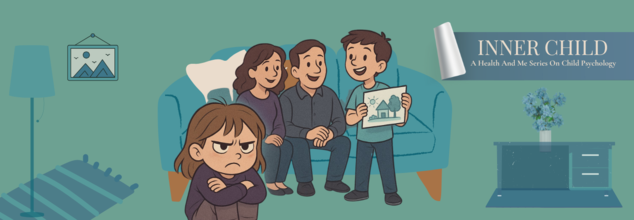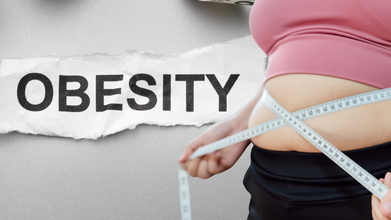- Health Conditions A-Z
- Health & Wellness
- Nutrition
- Fitness
- Health News
- Ayurveda
- Videos
- Medicine A-Z
- Parenting
Inner Child: Why Youngest Siblings Are Often Brushed Off As Defiant When All They Want Is to Be Heard

Credits: Canva and AI-generated
‘Inner Child’ is Health and Me's new mental health series where we deep dive into lesser-known aspects of child psychology and how it shapes you as you grow up. Often unheard, mistaken, and misunderstood, in this series we talk about the children’s perspective and their mental health, something different than you might have read in your parenting books. After all, parenting is not just about teaching but also unlearning.
Sometime 90 years ago, a psychologist proposed that birth order could have an impact on what kind of person the child becomes once they grow up. It is true, childhood, of course, shapes your personality as you grow up. But what does it mean to be the last one in the birth order?
It was the COVID-19 pandemic, when I started to jot down how I felt when suddenly I was home with my entire family under the same roof. Thanks to lockdown restrictions, I was again reminded that I am the youngest in the family. This is when I started writing a journal that I thought I would publish into a book once I finished it. I called it "To Be The Second Born". I jotted down my experience of being the youngest in the house, especially when everyone around me, including both my parents, are the oldest in their family.
Contrary to the belief that we are spoiled, I felt that we are often unheard and ignored, because we are always "too young" to be taken seriously. As a result, we revolt and are tagged as defiant. Five years down the line, my boss shared an Instagram reel that described how I felt. The reel went on to talk about how no one sees the struggle of a younger sibling. Or how everyone thinks they always got it easy. When, in reality, it is often because we are so used to being misunderstood that we shut ourselves down, not telling anyone about what is going on. Instead of fighting the 'defiant' tag, we start to live with it. We take responsibility, but never talk about it, because we know we will not be heard.
Watching that reel made me realize that it is not just me, but a lot of younger siblings who feel the same. While the book seems like a distant dream, a piece on it doesn't.
If you, too, feel the same, this one is for you.
ALSO READ: Inner Child: When the Bullied Turns Into A Bully – Psychology Of A Victim’s Defense Turned Attack
Too Young To Matter?
Krishna, 32, who is originally from Bihar, now in Pune, is the youngest of all the siblings. She has three older siblings, and she tells me that she often felt like a "stupid".
This is because her older siblings were very "authoritative". When asked why, she says, "I think culturally, we tend to equate age with wisdom and hence, anyone older than us automatically gets elevated to wiser in comparison."
She tells me that she, too, struggled putting her foot down and was often treated as a pushover. It was not until she turned 25 that she openly started to question whatever she was told. Before that, she used to hide things just to avoid confrontation.
The reaction was not pleasant. "There was a lot of gaslighting," she tells. However, she stayed firm and made it clear that she needs to be heard too, and should not be controlled.
To get a better understanding of why this happens, I spoke to Dr Rahul Chandok, who is a senior consultant and head of psychiatry at Artemis Lite, NFC, Delhi. Chandok explains, "When older siblings are in charge of younger ones and always telling them what to do or correcting them, the younger child may start to doubt themselves or feel bad about themselves. Being told what to do all the time can make it harder for them to think for themselves or trust their own decisions. As time goes on, they may start to hide their thoughts or not take the lead because they are afraid of being judged or criticized."
This dynamic can also make younger siblings more anxious or angry. Kati Morton, who is a licensed therapist and a public speaker renowned for her YouTube channel focused on mental health, points out that the youngest children might develop a heightened need for external validation to feel secure about their decisions and actions, potentially leading to anxiety about making mistakes or disappointing others.
Chandok explains that this is also true because of repeated invalidation. The reason why younger siblings may often feel like a pushover is because they have been constantly told that their opinions are wrong, "just because they are younger".
"Over time, such behaviors can hurt self-esteem, lower self-confidence, and make it hard to speak up for themselves in relationships or at work," explains Chandok.
But, Younger Siblings Are Perceived As Defiant And Indifferent
This is because people often get the wrong idea, explains Chandok. "If a child is always told what to do and never asked what they think, pushing back may be the only way they feel in control. If they don't follow directions, break rules, or act like they don't care, they might be trying to say, 'I want to be heard'," he explains.
However, not always are the relationships between a younger and older sibling as stringent. For instance, Ayush Upadhayay, 26, who has a three-year age gap with his older sibling, shares that while he has felt unheard, it has not always been a constant feeling. He tries to explain this and says, "They have responsibilities and feel that we are not yet ready for it."
When asked if that made him feel neglected or incapable, he said that earlier it used to make him feel that, however, now, he has confronted his older sibling. "Initially, she defended her behavior, later, she understood why I felt that way."
In Such Scenarios, What Can Families Do?
Families need to make room for everyone to have a say, no matter how old they are. Chandok also explains that families must encourage kids to talk to each other openly. This conversation must allow younger kids to be heard without being interrupted or judged. "Older siblings can make a big difference by asking for their opinions, respecting their choices, and not being bossy," says Chandok.
From a young age, parents too should encourage younger kids to make decisions, make choices, and not just praise them for following rules, but also being unique, thinking differently, even when their opinions may not match with the rest.
Demi Moore’s Drastic Weight Loss Makes Her Look Weak, Netizens Ask If She Took Ozempic

Credits: Instagram
When Demi Moore stepped onto the red carpet at the 2026 Actor Awards, the conversation quickly shifted away from couture and glamour. The 63 year old actor wore a striking black Schiaparelli gown with a dramatic feathered train, but what truly caught public attention was her noticeably thinner frame.
Photos from the event spread rapidly across social media, and many fans expressed worry over what they described as a “skeletal” appearance. Some questioned whether the transformation was intentional. Others speculated whether she may have used Ozempic, the diabetes medication that has become synonymous with rapid celebrity weight loss.
There has been no confirmation that Moore used any weight loss medication. Still, the public reaction reflects a growing anxiety about how quickly bodies can change in the era of injectable weight loss drugs.
The Ozempic Question
Ozempic was originally developed to help manage type 2 diabetes. Its active ingredient, semaglutide, works by mimicking a hormone that regulates blood sugar and appetite. Over the past few years, it has gained immense popularity for its ability to produce significant weight loss.
But as prescriptions surged, so did questions about side effects. One of the biggest concerns is loss of lean mass, which includes muscle.
Research published in Cell Metabolism examined how semaglutide affects body composition. In animal studies, overall lean mass dropped by about 10 percent during weight loss. Interestingly, much of that loss was not from skeletal muscle but from organs like the liver, which can shrink as body fat decreases. Some skeletal muscles did shrink slightly, by about 6 percent on average, while others remained unchanged.
However, other human studies suggest that people taking semaglutide may lose a substantial amount of muscle along with fat. One study found that around 39 percent of the weight lost was muscle. Research on tirzepatide, another injectable drug, showed muscle loss closer to 25 percent of total weight reduction.
It is important to note that muscle loss is not unique to Ozempic. Anytime someone loses a large amount of weight, whether through dieting, surgery, or medication, about one quarter to one third of that loss can come from muscle. When calories are restricted, the body taps into stored energy from glycogen, fat, and muscle.
The problem is that muscle matters. Losing muscle lowers metabolic rate, increases fatigue, and can raise the risk of falls or injury, especially in older adults. For women over 60, rapid weight loss may also affect bone health.
Why Rapid Weight Loss Raises Red Flags
When a public figure appears dramatically thinner within a short span of time, people naturally worry. Rapid weight loss can sometimes signal aggressive calorie restriction, illness, or medication side effects.
Even when weight loss is intentional, the speed matters. Quick changes can strain the body, impact strength, and alter facial structure, which may explain why some fans said Moore looked “different” rather than simply “slimmer.”
Healthy weight loss is not just about a number on the scale. It is about preserving muscle, supporting metabolism, and protecting long term health.
How To Lose Weight Without Losing Strength
If someone chooses to pursue weight loss, whether naturally or with medical supervision, protecting muscle should be a priority.
Prioritize protein. Most adults aiming for fat loss need between 60 to 90 grams of high quality protein daily. Protein supports muscle repair and helps maintain lean mass, especially when appetite is reduced.
Strength train consistently. Resistance training at least three to four times a week signals the body to hold onto muscle. Lifting weights, using resistance bands, Pilates, or bodyweight exercises all help.
Do weight bearing cardio. Walking, tennis, or light jogging can support both bone density and muscle retention.
Stay hydrated. Muscle is largely made of water. Dehydration can worsen fatigue and impair recovery.
Aim for slow, steady loss. Losing weight gradually gives the body time to adapt and reduces the risk of excessive muscle breakdown.
Demi Moore’s appearance has reignited a broader conversation about beauty standards, aging, and the pressures surrounding thinness. Regardless of the cause behind her transformation, the moment highlights an important truth. Sustainable health is about strength, balance, and care, not just shrinking numbers on a scale.
Not All Vitamins Work The Same For Women: What and When To Take|Women's Day Special

Multivitamins are essentially dietary supplements containing a combination of various vitamins and minerals, often used to bridge nutritional gaps in the diet, treat deficiencies caused by poor nutrition or illness and support overall health.
Designed to provide a broad range of nutrients in one daily dose, they are available in tablets, capsules, gummies or liquids and are widely recommended to adults of all ages and genders.
But which vitamins do women need and when should you be taking them?
Dr Yashica Gudesar, Director & Unit Head of Obstetrics & Gynecology, Max Super Speciality Hospital, Dwarka exclusively tells Healthandme: "A woman’s nutritional needs change at different stages of life, from adolescence to reproductive years, pregnancy, and menopause. While food should always be the primary source of nutrients, certain vitamins may be required as women age or depending on lifestyle, diet, and health conditions."
"There’s honestly no universal vitamin checklist that works for every woman. The needs change with age, lifestyle, stress, whether one is planning a pregnancy, and of course, what the blood reports actually show," Bhakti Samant, Chief Dietician, Kokilaben Dhirubhai Ambani Hospital further told this publication.
Here are the supplements you need to stock your medicine cabinet with:
1. Vitamin D
Vitamin D is a fat-soluble nutrient essential for strong bones, immune function, and calcium absorption, often synthesized when skin is exposed to sunlight or obtained via food and supplements.
Symptoms of Vitamin D deficiency include bone pain, muscle weakness, and depression. Deficiencies are common due to low sun exposure or poor diet, leading to rickets in children and osteomalacia or osteoporosis in adults.
However, this can be avoided by consuming a combination of calcium and Vitamin D supplements. Dr Ginni Kalra, Head Dietician, Aakash Healthcare explained to Healthandme: "One of the frequently deficient nutrients in women is vitamin D. It is very important in calcium absorption, bone density, immune homeostasis and mood balance. In most adult women, the amount needed is 600-800 IU (15-20 mcg) per day although deficient women can take 1000-2000 IU per day under the supervision.
"Calcium is necessary in bone density especially in women post-menopause who experience rapid bone loss owing to the diminishing estrogen. Adult women should take 1,000 mg per day that rises to 1200 mg past 50 years. Calcium supplements are most ideal in separated doses of 500-600 mg each time and preferably following meals. When combined with vitamin D, absorption will enhance much better."
"Calcium becomes especially important after the age of 30, and even more after menopause. It can be taken after meals, often divided into two doses for better absorption," Dr Gudesar added.
Moreover, Samant advised: "Vitamin D is best taken with a meal that has some fat. Calcium (around 1000–1200 mg daily) is better split into two doses and should not be taken with iron."
2. Iron
A vital mineral, iron plays a very crucial role in human functioning by helping create hemoglobin to transport oxygen throughout the body, essential for energy and muscle function. Low iron levels can result in decreased oxygen transport and leading to symptoms like extreme fatigue, weakness, pale skin, cold hands/feet and shortness of breath.
While an iron deficiency is usually caused by poor diet, blood loss due to menstrual periods, ulcers, cancer, or regular use of pain relievers like aspirin or malabsorption issues, it can be remedied through supplements.
Dr Kalra explains: "Iron is also essential especially in menstruating women because they lose blood monthly. It may result in an iron deficiency which causes fatigue, loss of hair, brittle nails, and poor concentration. The acceptable amount of iron that is recommended to be taken by women aged 19 to 50 is approximately 18 mg, but this reduces to 8 mg after menopause.
"Iron supplements are better absorbed on an empty stomach or when taken with vitamin C and not when they are taken with calcium, tea or coffee as they have been found to interfere with absorption. The intake in the morning is usually desirable, but in case of gastrointestinal discomfort, it should be avoided."
3. Vitamin C
Vitamin C is essential for the body because it serves as a powerful antioxidant, supports the immune system, and is crucial for the synthesis of collagen, which is vital for wound healing and the maintenance of healthy skin, bones, and blood vessels.
It also enhances the absorption of iron from plant-based foods and protects cells from damage caused by free radicals, potentially reducing the risk of chronic diseases like cancer and heart conditions.
While, foods such as oranges, lemons, red and green peppers, kiwifruit, broccoli, strawberries, and Brussels sprouts can provide help maintain Vitamin C levels, supplements can help boost absorption and maximize benefits.
Dr Kalra notes: "Vitamin C helps to maintain the immunity, collagen synthesis, and iron uptake. It should be taken in 75 mg daily by adult women. It is soluble in water and can be consumed together with breakfast."
Additionally, she also recommends intaking: "Vitamin E and vitamin A also help the skin, vision, and antioxidant defense, but overconsumption is not advisable because it may be toxic."
4. Omega 3
Omega-3 fatty acids are polyunsaturated fats known for their crucial role in brain function and overall mental health. Fish oil is particularly rich in EPA and DHA, which are vital components of cell membranes and have strong anti-inflammatory effects in the body.
These omega-3s play a critical role in human development, and they are primarily found in fatty fish and fish oil. Some popular sources of Omega-3 include:
- Salmon
- Cod Liver Oil
- Algae Oil
- Oysters
- Nuts and seeds, such as flaxseeds, chia seeds, and walnuts
- Plant oils, such as flaxseed oil, soybean oil, and canola oil
- Fortified foods, such as eggs, yogurt, juices, milk, etc.
But as many people do not consume enough fish, supplementation is often recommended to ensure adequate intake of these essential fatty acids.
Dr Kalra suggests: "Though not vitamins, omega-3 fatty acids are worth mentioning because of the cardiovascular, hormonal, and anti-inflammatory effects. About 250–500 mg of combined EPA and DHA a day may be helpful and is most often administered after meals."
5. Vitamin B12
Vitamin B12 (cobalamin) is a crucial water-soluble vitamin necessary for brain health, nerve tissue, red blood cell formation, and DNA synthesis. It helps the body produce red blood cells, supports your nervous system and essential for making DNA, which is the genetic material inside all your cells.Symptoms of a Vitamin B12 deficiency often appear slowly. You may not notice them at first, or may blame them on stress, lack of sleep or a busy schedule. However, if the deficiency continues for long, it could lead to serious health problems.
Dr Gudesar recommends: "Vitamin B12 supports nerve health and energy levels. Vegetarian women are more prone to deficiency. It is typically taken in the morning."
"Vitamin B12 is needed to promote nerve well-being, red blood cell building, and energy conversion. The chances of deficiency are increased in vegetarian women because B12 is mostly found in foods of animal origin. The suggested daily dose is 2.4 mcg, but the dosage can be raised in deficiency. It is preferable in the morning as it could increase alertness," Dr Kalra explained.
However, Dr Kalra also advises: "There should be individualization of supplement timing and dosage. Decisions should be based on routine blood tests, dietary assessment, age, lifestyle, and existing medical conditions.
"Excessive supplementation is detrimental, in particular, fat-soluble vitamins. The only safe and effective approach is nutritional adequacy by means of whole foods, and supplements are the supportive therapy only in cases where deficiencies are observed."
World Obesity Day 2026: Date, Significance, And History

(Credit - Canva)
Observed on 4th March, World Obesity Day is a stark reminder that obesity is not just a lifestyle condition anymore, it is life-threatening disease that is affecting nearly 3 billion people in the world. According to the World Obesity Organization by 2035, half of the world’s population, which is 4 million people, will be overweight or obese.
A major risk factor for this is childhood obesity as it often continues into adulthood. This not only increases their risk of cardiovascular disease but also non-communicable diseases such as diabetes, and some cancers.
World Obesity Day 2026 Theme: 8 Billion Reasons to Act
The theme for 2026 highlights that obesity affects every corner of the globe. There are 8 billion people on Earth, and every single one of us has a reason to care. This year’s campaign focuses on how obesity is tied to deeper issues like poverty, unequal healthcare, and the lack of healthy food options. It’s a reminder that our environments, not just our choices, shape our health.
World Obesity Day 2026 History
Since its launch in 2015, World Obesity Day has worked to change how the world views this disease. For over a decade, the movement has focused on uncovering the root causes of obesity, fighting weight stigma, and making sure the voices of those living with obesity are heard. What started as a small initiative now involves hundreds of organizations and hundreds of thousands of people every year.
World Obesity Day 2026 Significance
The scale of this challenge is massive. Currently, nearly 3 billion people are living with overweight or obesity. By 2035, that number is expected to hit 4 billion, which is half of the entire world population.
This isn't just about adults. Childhood obesity has increased fivefold since 1975, particularly in lower-income countries. Because childhood obesity often leads to serious health issues later in life, like heart disease and diabetes, addressing this early is vital for global health.
What Is The Leading Cause Of Obesity?
The World Health Organization explains that at its simplest level, overweight and obesity happen when the body takes in more energy from food and drink than it uses up through movement and daily activity. When this "energy balance" is off over a long period, the body stores the extra energy as fat. For most people, obesity is a "multifactorial" disease—meaning many different things work together to cause it. This includes:
Your Environment: The world around you (like what food is available).
Psychology: How your mind and social life affect your eating habits
Genetics: Small variations in your DNA that influence your weight.
The world we live in plays a huge role in our health. Many people face "environmental" barriers that make staying healthy difficult, such as how available healthy sustainably grown food is for you, whether the place you live in has enough space to exercise or play in etc.
Call to Action
The future is not set in stone. We can change the story of obesity by:
- Choosing empathy over stigma and judgment.
- Prioritizing prevention for children and young families.
- Demanding fair access to healthcare and nutritious food for everyone.
© 2024 Bennett, Coleman & Company Limited

